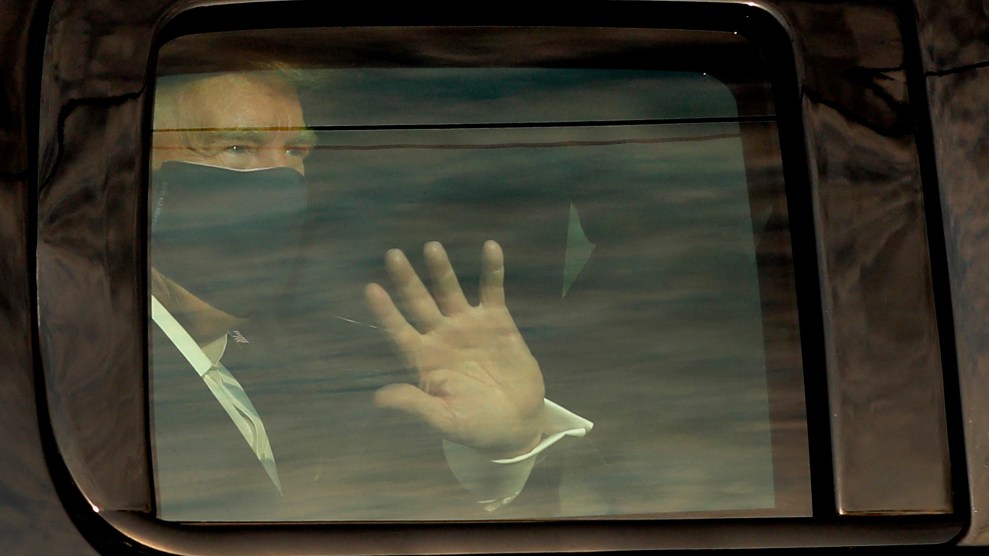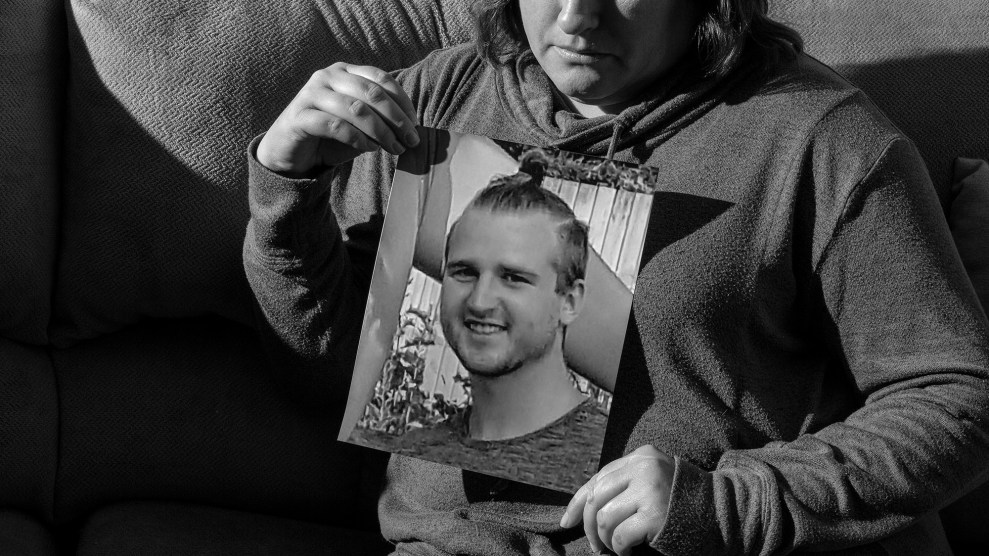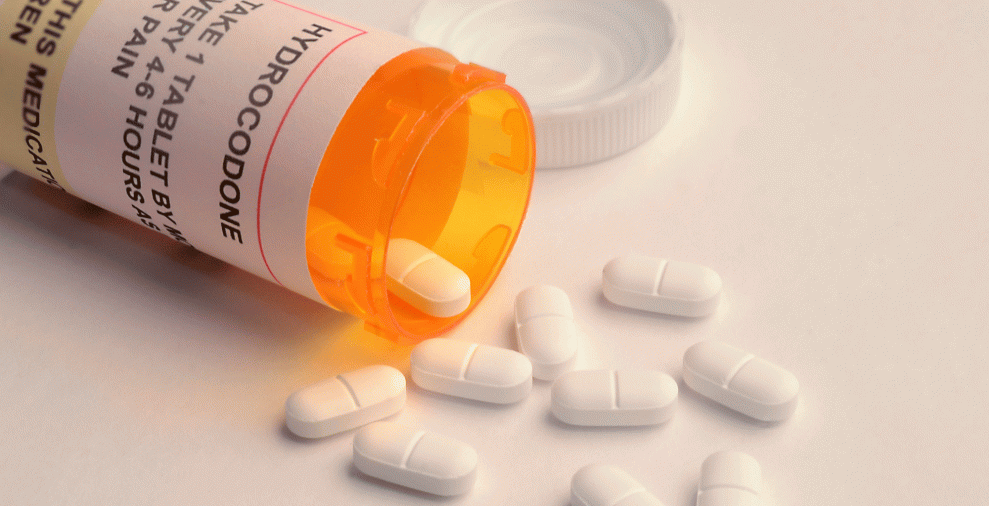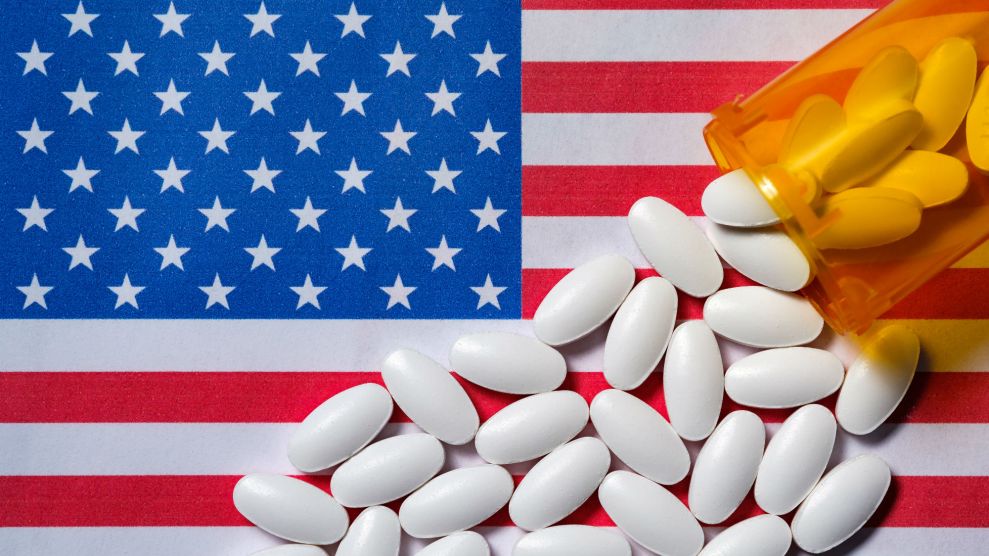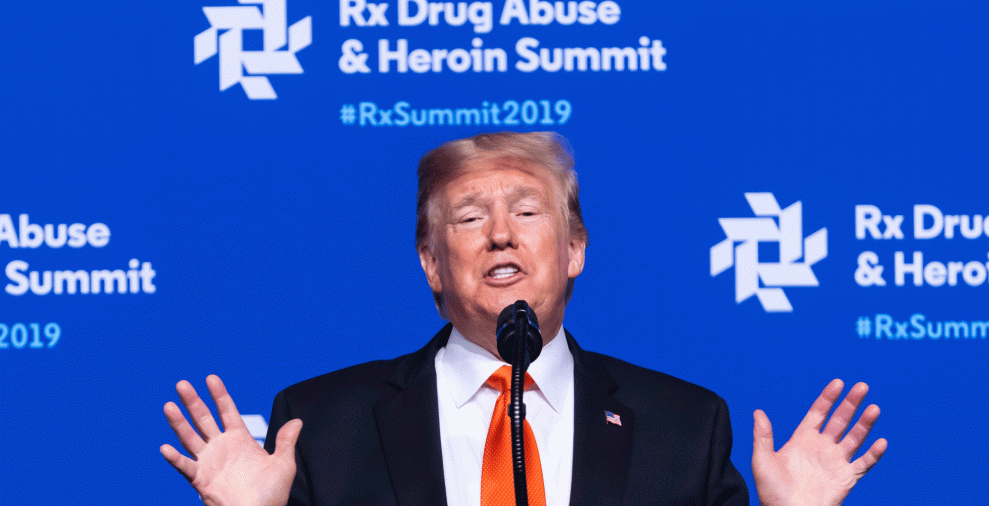
John Amis/AP
Ever since the start of the pandemic, President Trump has taken to repeating, like a mantra, that the coronavirus will vanish into thin air. “It’s going to disappear one day,” he said in February. “It’s like a miracle—it will disappear.” This week, after spending three days at Walter Reed Medical Center undergoing experimental treatment for his own case of COVID-19, he triumphantly told Americans, “Don’t be afraid of COVID.”
Trump’s magical thinking, while breathtaking in its callousness, is nothing new. In fact, his unfounded promises bear a chilling resemblance to his claims about another health crisis: the opioid epidemic.
“The number of drug users and the addicted will start to tumble downward over a period of years,” he said in 2017, when he declared the opioid crisis a public health emergency. “It will be a beautiful thing to see.” A year later, in New Hampshire, he proclaimed, “This scourge of drug addiction will stop. It will stop.” He went on, “We will raise a drug-free generation of children.”
This year, the overdose epidemic has gone barely mentioned on the campaign trail, eclipsed by the coronavirus pandemic. The only passing mention of addiction during last week’s presidential debate came when Trump attacked Biden for his son’s cocaine use. But in a way, the overdose epidemic and the coronavirus pandemic are variations of the same story: one characterized by lip service, disorganization, and making a big show of quick fixes while simultaneously threatening to cut critical social services. In both cases, the deaths have mounted as the blithe promises have continued. Neither is anywhere close to its magical end. Overdoses claimed an estimated 72,000 lives last year, a 12 percent increase from when Trump was elected into office.
The lesson, says Harvard health economist Richard Frank, is that “if you suck on public health, you’re going to suck on public health across the board.”
Ever since the beginning of his presidency, it has been unclear, even to those of us covering the epidemic full-time, who is overseeing the administration’s work on opioids. Soon after taking office, in 2017, Trump appointed then–New Jersey Gov. Chris Christie (R) to guide an opioid task force, which created a list of public health-oriented recommendations that drug policy experts on both sides of the aisle commended. But without funding or leadership to implement the changes, the efforts stalled. The same year, Trump famously declared the opioid epidemic a public health emergency—but a Government Accountability Office report later found that little came out of it. For months, the top political appointee at the federal office charged with coordinating the nation’s anti-drug initiative—an office that Trump nearly eliminated in budget cuts—was a 24-year-0ld former campaign staffer. For a time, Kellyanne Conway, who had no prior experience with addiction issues, was spearheading the opioid agenda, which had the effect of “quietly freezing out drug policy professionals and relying instead on political staff,” reported Politico.
But perhaps the biggest shortcoming in addressing the opioid epidemic since Trump took office has been in funding. While Trump has signed legislation that has allocated some funding toward addiction treatment and drug interdiction efforts, the money—in the “single-digit billions,” as German Lopez at Vox put it—pales in comparison to what experts deem necessary to making a dent in the problem. For perspective, in 2018 Sen. Elizabeth Warren and the late Rep. Elijah Cummings presented a bill that would have provided states $100 billion over 10 years, modeled directly after the legislation Congress passed in 1990 that provided an infusion of federal funding to combat the HIV/AIDS crisis. Former Vice President Joe Biden’s campaign meanwhile has a detailed plan to spend $125 billion over 10 years to quell the overdose epidemic.
While he’s done little to help the epidemic, Trump has certainly taken steps to make it worse—critically, by steadily chipping away at the Affordable Care Act, which made addiction treatment available to hundreds of thousands of people. A recent JAMA study found that Medicaid expansion, a key component of the ACA, was associated with a 6 percent reduction in opioid overdoses. The ACA “was designed to be very broad, but at the same time we knew that if there was anything that this would help a lot for, it’s addiction,” Keith Humphreys, a Stanford drug policy expert who advised the Obama administration, told me in 2017.
That year, Trump and his allies in Congress got one step closer to doing away with the ACA altogether, with the passage of landmark tax legislation that repealed the individual mandate. The Congressional Budget Office estimated that as a result of this law, the number of uninsured Americans would increase by 13 million over the 10 years. Of those 13 million, Frank estimates that one-third—or about 4 million Americans—struggle with addiction or mental health. Trump’s war on the ACA has continued since then, with his administration supporting a lawsuit that would undo the legislation altogether. It is scheduled to be heard next month by the Supreme Court.
Meanwhile, the Trump administration continues to promote work requirements for recipients of Medicaid, the nation’s largest addiction-coverage provider. Such rules, Frank notes, are “especially harmful for people with addiction,” presenting yet another hurdle to recovery.
The result is that, by almost any measure, the epidemic has worsened during Trump’s presidency. Preliminary data suggests overdoses rising steeply this year in a number of states, as fentanyl, a powerful synthetic opioid that has for years devastated communities east of the Mississippi, permeates the drug supply in the West. Fentanyl continues to flow into the country from China, where enforcement of recent rules banning the production of some variants of the drug remains minimal. A recent Brookings report noted that “in the midst of ongoing rancor with the United States,” China’s motivation to crack down on fentanyl “may be lacking as well.”
Meanwhile, rehabs remain inaccessible to many and simultaneously underregulated and thus ripe with fraud. While numerous studies show that access to addiction medications dramatically improves recovery prospects for people addicted to opioids, as of last year, only about one-third of treatment programs offer any of the three FDA-approved drugs.
In recent months, Trump has taken to using reports of increasing overdoses and suicides due to social isolation as a rallying cry to reopen the country. He’s right that such deaths appear to be increasing, but the solution, experts argue, is to make substance use treatment and harm reduction services more accessible—not to reopen. In fact, some states with particularly high overdose death rates, like Florida, have also seen soaring COVID death rates.
The source of the poor response to both crises is fundamentally the same, says Frank: a public health infrastructure that has been slowly gutted over the past 30 years. In both the epidemic and the pandemic, surveillance has failed; just as we still don’t know how many people use drugs, or exactly how many people die of opioid overdoses each year, we also didn’t know in April how many ventilators we had in the country and where they were.
As Frank sums up the past few years of the nation’s overdose response, it’s impossible not to see parallels to the present. “Congress does a few things right and [Trump] signs the bill,” he says, “but then he puts alongside it a bunch of policies that cut the other way.”


